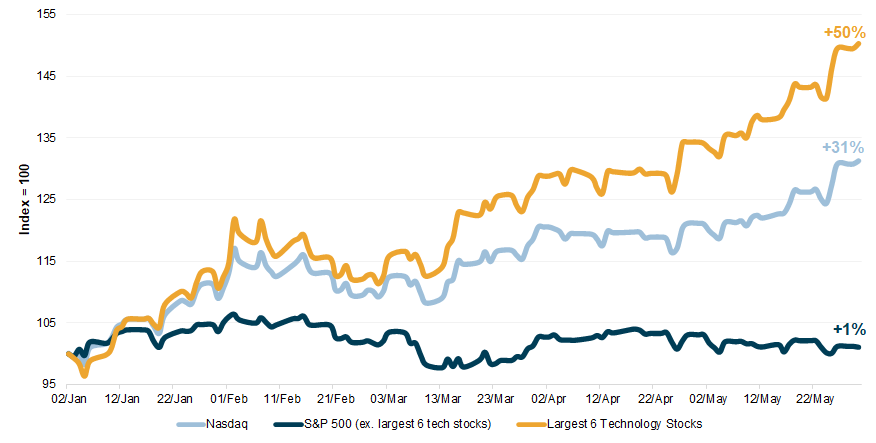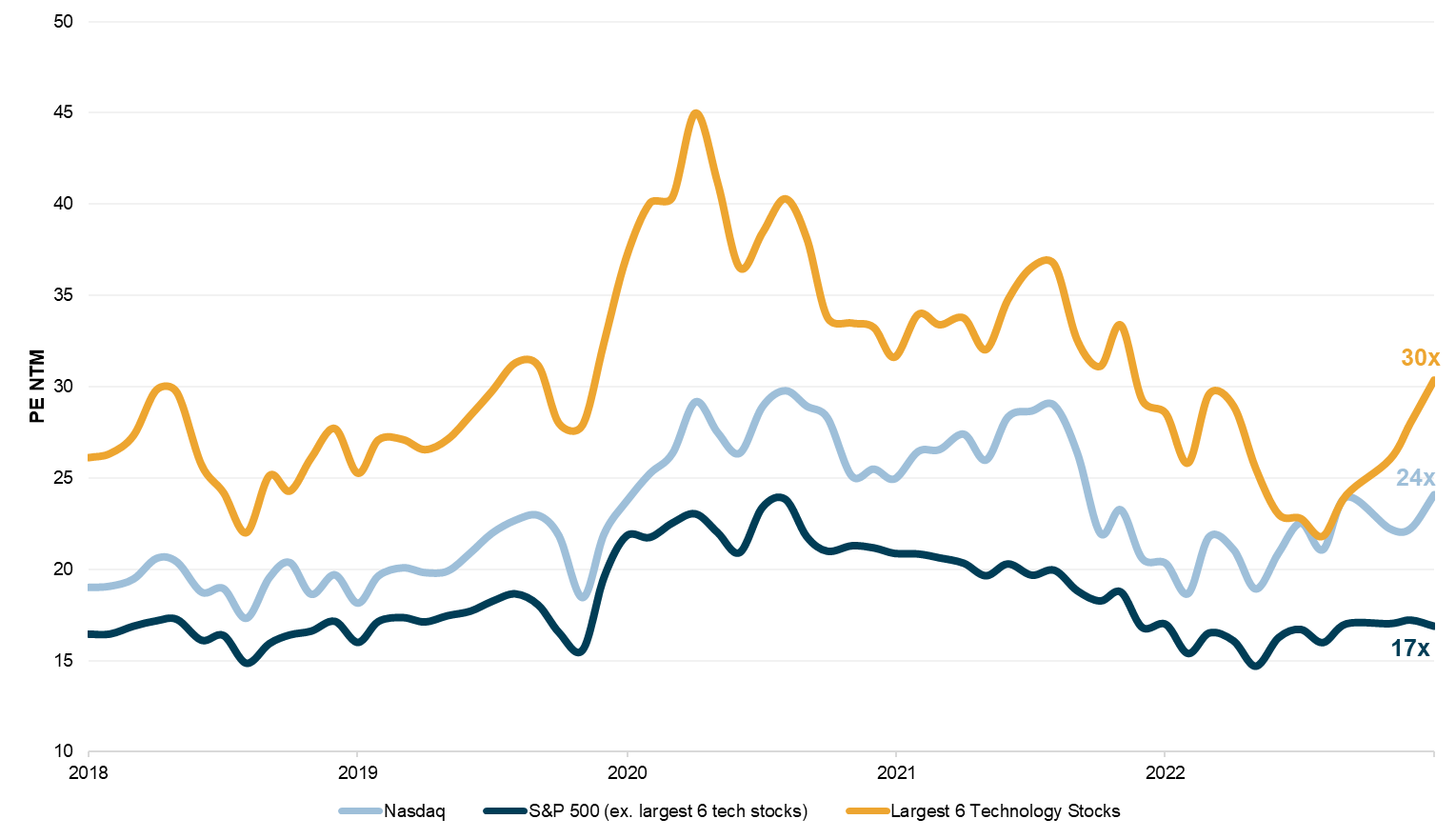Is growth back, or is this a trap?
It’s likely you’ve heard about “value traps” – low multiple companies priced at an ever expanding discount to the market which structurally underperform as fundamentals weaken due to new competition. In the extreme scenario they may even face complete obsolescence.
In a world where the pace of change has accelerated, we want to avoid those investments and it’s why Antipodes ascribes to a more pragmatic approach to value. We look for resilient businesses that are attractively priced relative to their growth profile and seek to avoid the traps.
While the market focuses on value traps, we don’t see the same discussion around potential growth traps. These are companies that are priced to perfection but see historical structural growth rates fall and become more cyclical. Ultimately, they disappoint lofty market expectations (i.e. no margin of safety in the valuation to accommodate for a lower more volatile growth profile).
Recession fears, expectations of a Fed pivot, and the “will there/won’t there” be a credit crisis has seen the market crowd back into the recent expressions of secular growth.
Figure 1 shows that the YTD price performance of the S&P500 has been held up by mega-cap tech.
Figure 1: 2023 Price Performance
.png)
So, is it time to return to the growth trade, or is the market piling into growth traps?
A recession is a difficult environment for all businesses – both cyclical and growth companies can disappoint on fundamentals. But the data suggests that the higher the starting multiple, the greater the drawdown an investor will typically experience in this environment.
In this context, US mega-cap tech stocks have re-rated to 30x next year’s earnings forecasts, which is meaningfully more expensive than the S&P – a benchmark which itself is expensive compared to Europe and China at 13x forward earnings (Figure 2).
Figure 2: Forward Price/Earning Multiple
.png)
Additionally, many of the consumer facing mega-cap tech stocks are in a different stage of the business cycle compared to the prior decade. These businesses are naturally maturing and becoming more cyclical. Competition is rising, growth rates are slowing, and they are becoming more sensitive to the economic cycle.
Apple (NASDAQ: AAPL) is a good example of this.
Apple is a quality franchise, but the company generates two-thirds of its gross profits from hardware sales and global handset sales have been weakening for some time. While Apple has been taking market share, its handset sales are also declining this year.
The average iPhone customer still replaces their handset every three years while the replacement cycle of all other handsets in the developed world is closer to five years. Any lengthening in Apple’s replacement cycle represents a meaningful headwind to profits. Despite this, the company is still priced at 29x earnings, with this year’s earnings forecast to fall 2%. Apple’s earnings are increasingly sensitive to the consumer spending cycle, and may not be as defensive as they once were.
Everyone’s talking about AI. Here’s our view
Akin to Apple, the recent popularity of ChatGPT shows Alphabet’s (NASDAQ: GOOGL) search business (Google) may not be as impenetrable as assumed. The number of daily desktop sessions on Microsoft-backed ChatGPT is approaching 10% of Google search daily desktop sessions. We know Alphabet is a formidable competitor and the company will respond, but the data suggests the output of a search query using generative AI is more costly than a standard Google search query because of the compute cost.
The competitive landscape is changing, and Microsoft may have all to gain with little to lose while the reverse could be said of Alphabet. It is early days, but the margin of error – or range of outcomes in Alphabet’s investment case – has widened. Like Apple, Alphabet’s earnings may not be as defensive as they once were.
Similar examples can be found in e-commerce, video streaming and digital advertising where penetration rates are already high and growth has slowed.
We are surprised that in the face of a looming recession, the market is expecting revenue growth for consumer facing mega-cap tech to accelerate as the year wears on. And so, broadly speaking these companies are priced for perfection and have the potential to disappoint. They are our potential growth traps.
But there are opportunities.
Workloads will continue to move to the cloud and the evolution of AI is a structural opportunity. AI will increasingly infiltrate our lives in ways we are yet to fully appreciate, and it has incredible potential to revolutionise the way businesses serve customers. But AI is a long way from broad monetisation and there may be as many losers as winners.
While we remain underweight US mega-cap tech relative to the benchmark, our view is Oracle (NASDAQ: ORCL), SAP (ETR: SAP), Microsoft (NASDAQ: MSFT) and Meta (NASDAQ: META) offer a more pragmatic approach to AI, along with Taiwan Semiconductor Manufacturing Company (TSMC) (TPE: 233).
The key ingredients for successful AI models are an ability to deploy compute power cheaply, and a vast amount of quality proprietary data to train the model to deliver valuable insights. The four platforms above have the compute power, as well as the proprietary datasets, whether corporate (Oracle, SAP, Microsoft) or consumer (Meta, and Alphabet also has quality proprietary consumer data).
There will be large opportunities to upsell AI features within existing software to current users as well as launch new services. These companies are well-placed to monetise AI and are not priced for perfection. In the case of the semiconductors, the chips powering this AI revolution come via TSMC – who has a near monopoly over the manufacture of leading-edge chips – but is priced at just 15x forward earnings largely due to geopolitical concerns.


Where does that leave us in today’s mega-cap tech-led market?
Antipdoes agree that the Fed pivot is coming. Inflation is falling and the US economy (and that of the developed world more broadly) is deteriorating. However, the team is cognisant interest rates may not fall as quickly as the market expects – the market has already priced in 100bp of rate cuts by the end of this year – and the competitive landscape in mega-cap tech is shifting.
And while investors fixate on yesterday’s winners, they are missing the fact that investment cycles are changing. We are seeing a return to a “tangible” led capex cycle as policy makers around the world attempt to solve for risks around climate change and geopolitical tensions.
Companies that benefit from investment in decarbonisation and supply chain security/on-shoring will be tomorrow’s structural winners – in a similar vein to FAANGs over the past decade – and valuations remain attractive.
The Antipodes Global portfolios continue to hold around 30% exposure to companies that will benefit from the Energy Transition - including Siemens Energy (ETR: ENR), Siemens AG (ETR: SIE) and Terna (BIT: TRN) and Connectivity/Compute - including TSMC and STMicroelectronics (EPA: STMPA).
A key takeaway – be selective and avoid growth traps.
Learn more about Antipodes' award-winning global equities funds
Visit the Antipodes website, or follow the team on Linkedin.

1 topic
6 stocks mentioned
2 funds mentioned
.jpg)
.jpg)